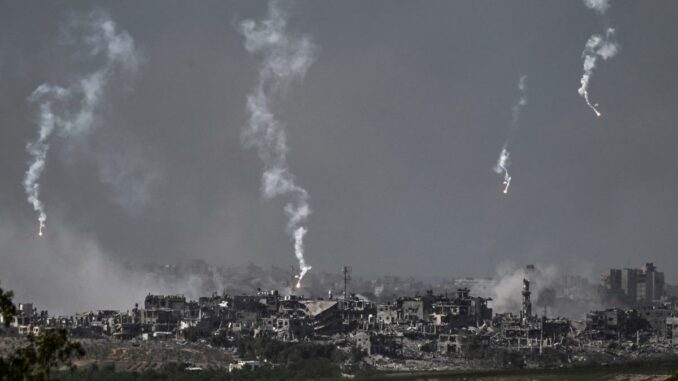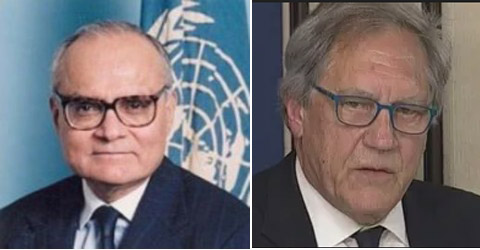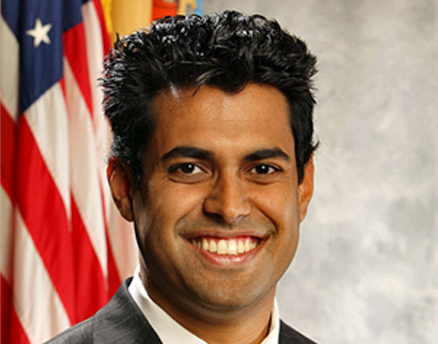
- The only lasting solution is for Israel to vacate its occupation of the West Bank and let a viable Palestinian state emerge
“To ensure Israel’s legitimate concern for the safety of its people, the new state should be demilitarized. Other measures can be thought of to assure the Israelis of their safety. Israel’s neighboring Arab states should all be engaged in this process. The Abraham Accords provide a foundation. If Israel has the vision of living in harmony in the region with its Arab neighbors, this is the only way. When that happens, Iran will lose its proclaimed reason for its anti-Israel tirades; Hezbollah will, likewise, lose its most important plank for threatening Israel. For decades, Israeli-Palestinian relations have been locked in a never-ending cycle of death, destruction and misery. The war in Gaza is the latest iteration. It should be the last. The Middle East could, finally, enjoy stable peace and security.”

All wars end. The Israeli-Hamas war will also end. When and how are still to be determined. But doing so is urgent. The United Nations says 1.3 million of the 2.3 million residents of the Hamas-controlled Gaza Strip have been displaced, and almost half of all homes in Gaza have been damaged or destroyed.
One outcome of a war is when both sides gain something of value to them. The Israeli-Hamas war is likely to end in that kind of scenario.
Israel will win in military terms, no doubt about that. But Hamas is likely to win in terms of a greatly increased following among Arab populations everywhere, including, especially, in the occupied West Bank.
The Palestine Authority, which has been ruling there for the past 30 years, has become vastly unpopular and corrupt. Palestine Authority President Mahmoud Abbas, the most moderate Palestine leader Israel could have ever hoped for, has failed singularly in making any progress towards the objective of establishing a Palestinian state in the West Bank. He is perceived as collaborating with Israel in its hunt for ‘terrorists’. The peace process has long been dead.
‘Right of self-defense’ and the reality
As United Nations Secretary-General António Guterres has reminded the international community, the Hamas attack on Israel on October 7, 2023, condemnable and despicable as it was, did not happen in a vacuum. Under Article 51 of the Charter of the United Nations, Israel has the inherent right of self-defense. The same article lays down that after acting in self-defense, the state concerned must report the action taken by it to the UN Security Council (UNSC). This does not seem to have been done. In any case, self-defense does not authorize the disproportionate or indiscriminate use of force against civilians. It has been reported that Gaza’s rate of death during Israel’s assault has few precedents in this century — almost 15,000, a majority of them women and children. This goes well beyond the prevailing customary law of self-defense.
The most important and troubling issue is: what happens when Hamas has been subdued? What takes its place? Some, including the U.S. President Joe Biden, have suggested that the Ramallah-based Palestine Authority should take over administering the Gaza Strip, once the situation becomes ready for that. ‘The rich Arab states’, a phrase widely cited in the media, would be asked to finance the rebuilding of Gaza. The only problem is that the Palestinians, in Gaza as well as in West Bank, do not want the Palestine Authority led by Mr. Abbas to rule anywhere, let alone Gaza.
The only available option is to hold fresh elections, in Gaza as well as in the West Bank, under international supervision as and when the situation allows. The UN should be asked to deploy a peace-keeping contingent on the border between Gaza and Israel to ensure security for both. The suffocating blockade of Gaza would be lifted. Israel does not like the UN, and likes the UN Secretary-General even less. It should be remembered that it was the UN that gave birth and legitimacy to the insipient state of Israel. The U.S. will need to take the lead on this in the UNSC.
Feasibility of two-state solution
Meanwhile, the proposal for a two-state solution, long pushed aside, has come alive. Everyone seems to be repeating the two-state mantra.
But how feasible is the two-state concept today?
The 1993 Oslo Accord envisaged Palestine to be based in the West Bank. Today, the West Bank is heavily populated by Israeli settlers, 4,50,000 at latest count. No Israeli government will succeed in persuading the settlers to return. Force would be required. The land is like Swiss cheese, having settler roads and innumerable settlements, with more planned. The current Israeli Prime Minister, Benjamin Netanyahu, will never agree to a Palestinian state, however truncated.
What is needed, as soon as conditions permit, is to have a reality check of the two-state proposal — what is feasible and what is not. Painful concessions will be required, including land swaps, and a monitoring mechanism established to hold each side to the commitments they make. The only lasting solution is for Israel to vacate its occupation of the West Bank and let a viable Palestinian state emerge.
Abraham Accords are a foundation
To ensure Israel’s legitimate concern for the safety of its people, the new state should be demilitarized. Other measures can be thought of to assure the Israelis of their safety. Israel’s neighboring Arab states should all be engaged in this process. The Abraham Accords provide a foundation.
If Israel has the vision of living in harmony in the region with its Arab neighbors, this is the only way. When that happens, Iran will lose its proclaimed reason for its anti-Israel tirades; Hezbollah will, likewise, lose its most important plank for threatening Israel.
For decades, Israeli-Palestinian relations have been locked in a never-ending cycle of death, destruction and misery. The war in Gaza is the latest iteration. It should be the last. The Middle East could, finally, enjoy stable peace and security.
(Chinmaya R. Gharekhan served as India’s Ambassador to the United Nations and as India’s Special Envoy to the Middle East, 2005-09. Karl F. Inderfurth served as the United States Deputy Ambassador to the United Nations Security Council and was Assistant Secretary of State for South Asia, 1997-2001)





Be the first to comment